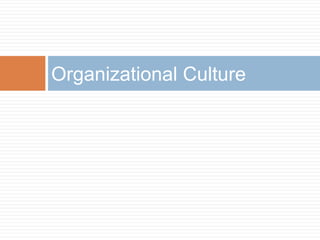
Organizational culture
- 2. Introduction Organizational Culture A system of shared meanings and common beliefs held by organizational members that determines, in a large degree, how they act towards each other. It is important to consider culture while managing change in the organization.
- 3. Key Characteristics of Corporate Culture Innovation and Risk Taking Attention to Detail Outcome Orientation People Orientation Team Orientation Aggressiveness Stability
- 4. Types of Culture Authoritarian culture Participative culture Mechanistic culture Organic culture Sub-cultures and Dominant culture
- 5. Importance of Organizational Culture Talent-attractor Talent-retainer Engages people Creates energy and momentum Changes the view of “work” Creates greater synergy Makes everyone more successful
- 6. Creating and Sustaining Organizational Culture
- 7. Creating Corporate Culture The ultimate source of an organization’s culture is its founders. Culture creation occurs in three ways: Employees hire and keep employees with same thinking They indoctrinate and socialize the employees with the organization’s thinking The founder’s behavior acts as a role model for the employees With the organizational success, the founder’s personality is embedded in the organizational culture.
- 9. Sustaining Organizational Culture Three forces play a particularly important part in sustaining a culture: • Selection practices • Actions of top management • Socialization methods
- 10. Selection Explicit goal – identifying and hiring individuals having knowledge, skills and abilities to perform the jobs successfully. Individuals having values consistent with those of the organization are selected as per the decision maker’s judgements. Selection becomes a ‘two-way street’ as it provides information about the organization to the applicants.
- 11. Top Management The actions of top management establishes the norms for the organization as to: • Whether risk taking is desirable • How much freedom managers should give to their subordinates • What actions will pay off in terms of pay rises, promotions and other rewards, etc.
- 12. Socialization Socialization refers to the preparation of newcomers to become members of an existing group and to think, feel, and act in ways the group considers appropriate New employees are not familiar with the organizational culture and are potentially likely to disturb the existing culture. The process through which the employees are proselytized about the customs and traditions of the organization is known as socialization. It is the process of adaptation by which new employees are to understand the basic values and norms for becoming ‘accepted’ members of the organization.
- 13. Socialization Process Socialization is a process made up of three stages: Pre-arrival - All the learning occurring before a new member joins. Encounter - The new employee sees what the organization is really like and confronts the possibility that expectations and reality may diverge. Metamorphosis - The relatively long-lasting changes take place. The new employee masters the skills required for the job, successfully performs the new roles, and makes the adjustments to the work group’s values and norms.
- 14. Socialization Model OutcomesSocialization Process Pre-arrival Encounter Metamorphosis Productivity Commitment Turnover
- 15. How Employees Learn Culture Stories – Depicting the past events of the organization. Some organizations actually try to manage this element of culture learning. Rituals – Repetitive sequential activities reinforcing the values of the organization. Material Symbols – Conveying social equality, desired organizational behavior, etc. by the top management. Language – Acceptance and preservation of culture.
- 16. Organizational Culture — Trends You Need to Know It’s hard to believe that the term “corporate culture” didn’t appear on the business landscape in a meaningful way until the early 1980’s. By contrast, another business term, “money”, developed almost 5,000 years ago! While corporate culture may seem like a newborn to the business world, important trends are emerging.
- 17. The Katzenback Center at Booz and Company surveyed 2,219 executives to better understand current perceptions of culture. Key findings include: 86% of C-suite respondents believe their organization’s culture is critical to business success 60% said culture is more important than the company’s strategy or operating model 96% said some form of culture change is needed within their organization 45% do not think their culture is being effectively managed.
- 18. The issue CEO’s face now is how to manage culture. The opportunity exists to stop promoting the business case and start educating CEO’s on the assessments, tools and processes available to help define, promote, evolve and monitor organizational culture.
- 19. Culture “fit” is becoming a major recruitment factor In Milewalk’s 2014 Annual Employee Survey respondents were asked to identify the top ten elements that they consider when looking to change jobs. While compensation and employee benefits still rate number one, culture was a close second.
